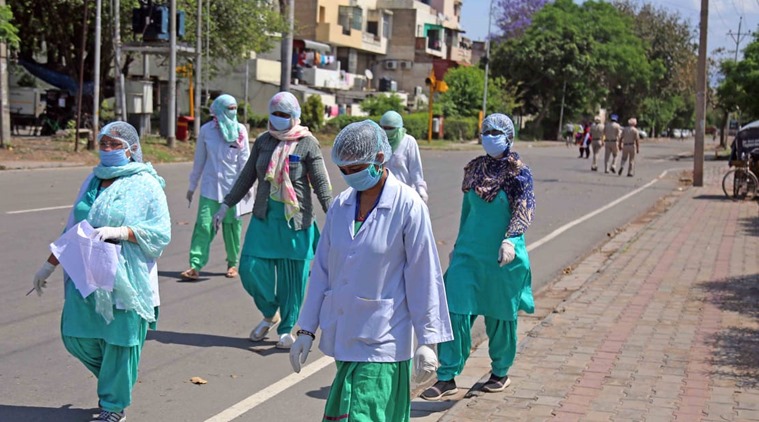 Though the typical work hours of an AMN and an LHV are between 8 am to 2 pm, most of these women often commute from afar, and work late into the evening, maintaining registers and uploading data digitally at home.(Representational)
Though the typical work hours of an AMN and an LHV are between 8 am to 2 pm, most of these women often commute from afar, and work late into the evening, maintaining registers and uploading data digitally at home.(Representational)
“One cannot see our work as merely a job, because the compensation is not enough to be lucrative. We have to accept our work as a form of social contribution now,” says a 32-year-old Auxiliary Nurse Midwife (ANM) from the city, who has been working on the frontline, surveying Covid-19 hotspots in the city, often with minimal protective gear.
As the world celebrates nurses everywhere on International Nurses Day on Tuesday, in India, along with the contributions made by nursing staff in hospitals, the paramedical community workers such as the ANMs and the Lady House Visitors (LHV’s), also have to be appreciated.
The paramedic staff plays a pivotal role in ensuring that healthcare and basic sanitation standards are introduced to the masses in India. In light of the coronavirus pandemic, one of the biggest public health crisis witnessed in the modern world, ANMs and LHV’s have proved to be vital agents of public healthcare- surveying and screening congested neighborhoods without PPE kits, and counselling riled up citizens through the night.
“To many, we are the only face of medical support. We are the ones who go to their house if they need us. We are the ones they call in the middle of the night sometimes if they don’t have an ambulance. They don’t have access to a family doctor or a private clinic, they trust in us and us alone,” says an ANM living in Sector 37, who has been posted on door-to-door screening duty in Bapu Dham colony twice. The ANM who is otherwise posted in the dispensary of a Covid-19 affected pocket in the city, states she gets calls from panicked residents who worry about their health late into the night. “All our registered patients have our personal contacts. These are mostly women who we have treated during their pregnancy, or vaccinated their children, but now they also call us for Covid-19 related queries and we have to facilitate if they need an ambulance,” says the ANM.
Though the typical work hours of an AMN and an LHV are between 8 am to 2 pm, most of these women often commute from afar, and work late into the evening, maintaining registers and uploading data digitally at home.
Furthermore, the long-drawn work hours and their vital role is not appropriately compensated with monetary benefits or job security. Most ANMs and LHVs are contractually hired, and less than ten of these in the UT have been offered a permanent position till now. While permanently placed ANMs receive Rs 45,000 a month, those contractually hired get Rs 10,000 a month. “Since the pandemic hit us, we have foregone all our holidays as well, often working through Sundays, exposing ourselves and our families to the disease by working on the frontline. Still we have received no extra benefit or assurance about our family’s safety or even a pat on our backs,” says the LHV.
“But people rely on us and we continue to work because we can’t let them down,” she concludes.